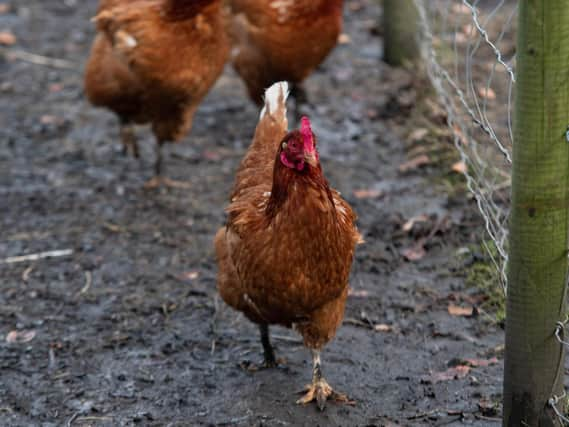'Rescuing battery hens has been a lifeline during lock-down,' says Hoghton grandma


But Hoghton grandma Tracy O'Reilly says the eight brown battery hens are now thriving after she rescued them two weeks ago, just before lock-down, and gave them a spacious new home in her allotment.
The 51-year-old, who works for the South Ribble Mayor, adopted them from an Out Rawcliffe farm near Garstang where they were cooped up inside, could barely move and had little access to sunshine and fresh air.
Advertisement
Hide AdAdvertisement
Hide AdThe grandma-of-four, who already has nine hens and two cockerels, said: "They had lots of bald patches and were very bedraggled. You could a lot of their skin.
"The best way I can describe it is like when you're poorly and your hair goes lank and drab.
"They go dull and almost scaly-looking without enough sunshine and fresh air. And they end up shedding something that is a bit like dandruff."
But, she added: "Within two weeks, the colour and shine were back in their feathers, and they're starting to grow new ones.
Advertisement
Hide AdAdvertisement
Hide Ad"They now have a good life. They're how chickens should be - free to run around and not cooped up.
"And, they get extra treats from our allotment."
Her care has also transformed their temperament and character.
"They're quite happy now," Tracy said.
"They're like kids playing and rolling in the grass. It's nice to see.
"They're little characters. One pecks you on the heel for a treat and another goes on her haunches so she can be picked up and cuddled. They're very friendly.
Advertisement
Hide AdAdvertisement
Hide Ad"And my dog loves being out among them. She plays with them and if any of the cockerels are bothering the females, she'll stop them."
Tracy adds that hundreds of birds can be crammed into a battery farm and are kept heated to induce egg-laying.
"Farmers get rid of chickens when they stop laying eggs every day," she added.
"I always try to buy the best eggs I can because I know what conditions the hens are kept in.
Advertisement
Hide AdAdvertisement
Hide Ad"Eggs are a well sought-after food and I get why the farmers do it but it doesn't do the chickens any good.
"I support charity Give A Hen A Home North-West and they look after thousands of birds at a time.
"I dread to think what happens to the ones that aren't re-homed."
Battery cages were banned in the UK in January 2012. There are now only three higher welfare methods of egg production: free range, barn and enriched colony cage.
Advertisement
Hide AdAdvertisement
Hide AdHens that are used in the egg industry are sent to slaughter at the age of 72 weeks, when their egg production usually drops slightly, according to Lucky Hens Rescue in Wigan.
They are often sold for pet food.
Caged hens who spend their lives in very small cages laying eggs that can be bought in supermarkets, are usually sent for slaughter at around 18-months-old.
But those who are not forced to lay an egg everyday and are brought up in the right conditions can normally live up to 10 years, says Alison Thorpe, who set up the Wigan animal sanctuary.
The coronavirus has also worsened the plight of chickens, says Tracy.
Advertisement
Hide AdAdvertisement
Hide AdShe belongs to a Facebook poultry rescue group and says that members down south have had their female birds stolen.
"It's because of the Covid-19. People see them as food," she said.
"Luckily, we're off the beaten track, we have a completely fenced and secure area for the birds, and everyone on the allotments knows each other, so we look out for one another.
"The worst issue we have is foxes, so we have to lock the chickens up at night to keep them safe."
Advertisement
Hide AdAdvertisement
Hide AdThe flock should be back to full health within six months thanks to Tracy's love and attention.
And, she adds, caring for them has been a "lifeline" for her too.
She said: "We're going through a horrible time and if I didn't have the hens to keep me going, I don't know how I'd cope. They've been a lifeline."
For more information about helping to save poultry, visit https://www.giveahenahome.co.uk/
Comment Guidelines
National World encourages reader discussion on our stories. User feedback, insights and back-and-forth exchanges add a rich layer of context to reporting. Please review our Community Guidelines before commenting.